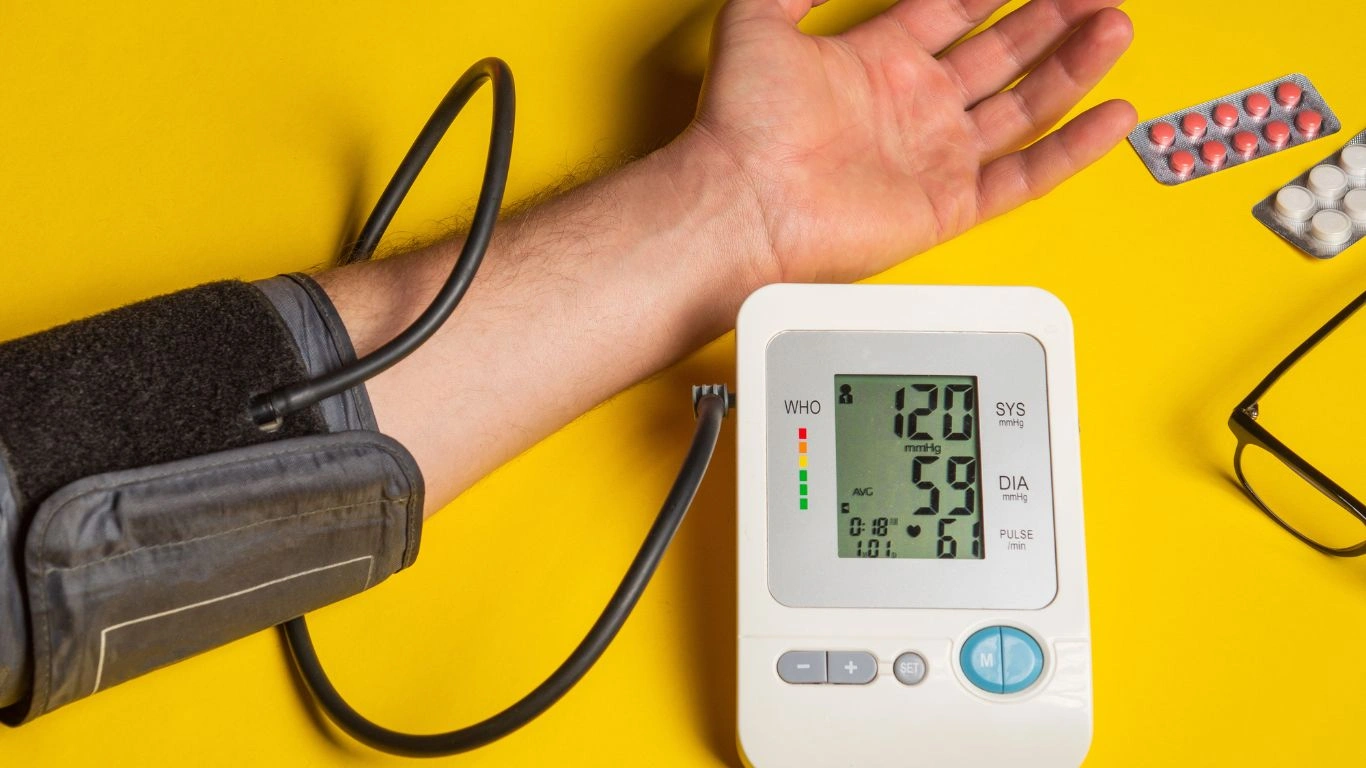Managing High Blood Pressure with Slow Pulse: What You Need to Know
High blood pressure with slow pulse is one of those puzzling situations that I’ve come across quite a few times in my years managing hypertension as an internal medicine physician. Usually, when we think of high blood pressure—also known as hypertension—we imagine a fast or pounding heartbeat, right? But sometimes, patients show up with elevated blood pressure and a slow pulse, which can throw you off the usual diagnostic track. This combination isn’t as rare as you might think, and understanding it is key to delivering the right care and avoiding unnecessary alarm.
What Exactly is High Blood Pressure with Slow Pulse?

Let’s break it down in simple terms. High blood pressure means the force of blood pushing against your artery walls is consistently too high. Normally, your heart compensates for this by pumping faster or harder to maintain adequate circulation. But in some cases, the pulse—essentially your heartbeat—can actually be slower than expected. This slower pulse is medically termed bradycardia, which means a heart rate below 60 beats per minute in adults.
When you combine these two—high blood pressure and a slow pulse—it might seem counterintuitive. After all, shouldn’t a slow pulse mean the heart isn’t working hard enough to push blood, thus causing lower pressure? But the reality is more complex, and that’s why it’s critical to understand the underlying causes rather than jump to conclusions.
Why Does This Combination Happen?
In my clinical experience, there are a few common reasons why someone might have this unusual pairing:
- Medications: Many patients with hypertension are on medications like beta-blockers or calcium channel blockers, which slow the heart rate but keep blood pressure elevated.
- Underlying Heart Conditions: Conditions such as heart block or sick sinus syndrome can cause the heart to beat slowly, even if blood pressure remains high.
- Autonomic Nervous System Imbalance: Sometimes, the body’s control of heart rate and vascular resistance gets out of sync, especially in older adults or those with neurological disorders.
- Physiological Adaptations: Well-trained athletes often have slow resting heart rates but may still have moments of high blood pressure due to various factors.
Understanding these causes can make a huge difference in treatment. For instance, if the slow pulse is medication-induced, adjusting doses or switching drugs can help. But if it’s due to heart block, more advanced interventions might be necessary.
Signs and Symptoms to Watch For

Many people with high blood pressure and slow pulse might not feel anything unusual. But in some cases, especially when the pulse is very slow, symptoms can develop, including:
- Dizziness or lightheadedness
- Fatigue or weakness
- Shortness of breath
- Chest discomfort or pain
- Fainting or near-fainting episodes
During my practice, I’ve seen patients dismiss some of these symptoms as “just part of getting older” or “stress.” That’s why I always emphasize the importance of regular monitoring, especially if you’re on heart or blood pressure medications. If you experience any of these signs, it’s crucial to consult your doctor promptly.
How Is It Diagnosed?
Diagnosing high blood pressure with slow pulse is straightforward in theory but requires a bit of detective work:
- Blood Pressure Monitoring: Regular and accurate measurements are the first step.
- Pulse Check: Palpating the pulse or using ECG to confirm heart rate and rhythm.
- Electrocardiogram (ECG): This helps identify arrhythmias, blocks, or other electrical issues in the heart.
- Holter Monitor: Sometimes, we need to track heart rate and rhythm over 24-48 hours to catch intermittent problems.
- Blood Tests: To check for thyroid problems, electrolyte imbalances, or other metabolic causes.
From my viewpoint, combining these tools gives a clear picture and ensures we’re not missing a serious underlying condition. It’s always about looking at the whole patient, not just the numbers.
Treatment Approaches for High Blood Pressure with Slow Pulse

When it comes to treating high blood pressure with slow pulse, there isn’t a one-size-fits-all approach. From my experience working with diverse patients, the key lies in understanding the root cause and tailoring therapy accordingly. I can’t stress enough how important it is not to rush into treatment without a full picture because the combination of high blood pressure with slow pulse can have very different implications depending on why it’s happening.
For example, if a patient’s slow pulse is medication-related, such as from beta-blockers, the solution might be as simple as adjusting the dosage or swapping medications. But in cases of intrinsic heart problems like heart block, things can get trickier and sometimes require pacemaker implantation to keep the heart rate steady.
Medications: Balancing Blood Pressure and Heart Rate
Managing high blood pressure while also dealing with a slow pulse can feel like walking a tightrope. Many blood pressure medicines naturally slow the heart, so prescribing them requires a careful balance. Here’s what I usually consider:
- Beta-blockers: They’re great for controlling blood pressure but can reduce heart rate. If bradycardia is severe, I might lower the dose or choose a different drug.
- Calcium channel blockers: These can also slow heart rate, so I monitor patients closely when these are prescribed.
- Diuretics and ACE inhibitors: These medications typically don’t affect heart rate, making them good options when slow pulse is a concern.
- Individualized Care: Everyone’s different, so I always prioritize patient feedback, symptoms, and heart rate trends when tweaking therapy.
What I’ve learned over time is that the best outcomes happen when patients feel heard and involved. For instance, one of my patients was on a beta-blocker and complained about fatigue and dizziness. By simply adjusting the medication and adding lifestyle changes, her heart rate normalized, and her blood pressure stayed controlled without side effects.
Lifestyle Adjustments That Matter

Medications are just one part of the equation. In fact, I always encourage my patients to embrace lifestyle changes as a powerful tool in managing both blood pressure and pulse rate. These are simple but effective habits I discuss regularly:
Exercise – The Heart’s Best Friend
Physical activity is amazing for your cardiovascular system. But here’s a little secret from my clinic: not all exercises affect heart rate and blood pressure the same way. Moderate aerobic exercises like walking, swimming, or cycling can improve your heart’s efficiency, often helping to stabilize blood pressure and promote a healthy pulse.
However, for someone already dealing with a slow pulse, intense endurance training might not be ideal. It’s all about finding that sweet spot. I often recommend starting slow and gradually increasing intensity, monitoring how the heart responds.
Nutrition – What You Put On Your Plate Counts
Diet plays a huge role. Reducing salt intake, cutting back on processed foods, and focusing on heart-healthy options like fruits, veggies, whole grains, and lean proteins can make a noticeable difference. In my practice, I’ve seen patients drop their blood pressure significantly just by tweaking their eating habits.
Stress Management – More Than Just Relaxation
Stress affects the autonomic nervous system, which controls heart rate and blood pressure. Chronic stress can cause spikes in blood pressure and sometimes irregular heart rhythms. Techniques such as meditation, deep breathing exercises, and even simple hobbies can lower stress levels and support cardiovascular health.
Sleep – The Unsung Hero
Don’t underestimate good sleep! Poor sleep quality or sleep apnea can contribute to hypertension and heart rhythm problems. I always ask patients about their sleep habits because improving sleep can sometimes correct blood pressure and pulse irregularities naturally.
When to Seek Specialist Care

Sometimes, despite all best efforts, managing high blood pressure with a slow pulse requires the expertise of a cardiologist or electrophysiologist. Here are some red flags I advise patients not to ignore:
- Persistent dizziness or fainting spells
- Symptoms worsening despite medication adjustments
- Unexplained chest pain or shortness of breath
- Episodes of confusion or extreme fatigue
Referral to a specialist often means more advanced testing like electrophysiological studies or pacemaker evaluation, which can be lifesaving. From my clinical perspective, early involvement of specialists when necessary prevents complications and improves quality of life.
Overall, managing high blood pressure with slow pulse isn’t about quick fixes or panic. It’s about understanding the full story, continuous monitoring, and a team approach. With proper care, most people can lead full, healthy lives despite this complex condition.
Monitoring and Long-Term Management of High Blood Pressure with Slow Pulse

Managing high blood pressure with slow pulse isn’t a one-time event—it’s an ongoing process. In my years of practice, I’ve seen how consistent monitoring and patient engagement make all the difference between well-controlled health and preventable complications. It’s like gardening: you have to regularly check, prune, and adjust your care to keep everything thriving.
One of the most valuable tools I recommend for patients is home blood pressure monitoring. It’s empowering to have immediate feedback and share those numbers during visits. Plus, seeing trends over days or weeks helps us make smarter decisions about medications and lifestyle changes.
The Role of Technology in Monitoring
Nowadays, there are tons of devices and apps that track not just blood pressure but also heart rate and rhythm. In some cases, smartwatches with ECG functions can catch irregularities early, which is a game changer in hypertension management. However, it’s important to choose clinically validated devices and discuss readings with your healthcare provider to avoid unnecessary anxiety or misinterpretation.
In my clinic, I often encourage patients to keep a simple log of their readings alongside notes about how they feel—things like dizziness, fatigue, or palpitations. This holistic picture helps tailor care more effectively than numbers alone.
Common Questions and Myths About High Blood Pressure with Slow Pulse

Let’s clear the air on some misconceptions I often encounter during consultations:
“If my pulse is slow, my heart is weak and that’s dangerous.”
Not necessarily. A slow pulse doesn’t always mean the heart is failing. For example, athletes commonly have a low resting heart rate because their hearts pump efficiently. The concern arises when the slow pulse causes symptoms or is linked to electrical problems in the heart.
“High blood pressure with slow pulse is always an emergency.”
This combo can be concerning, but it’s not always urgent. What matters most is whether the patient has symptoms like chest pain, severe dizziness, or fainting. If those occur, immediate medical evaluation is warranted. Otherwise, it’s often a condition that can be managed carefully over time.
“I should stop my medications if I notice a slow pulse.”
Never stop prescribed medications without consulting your doctor. Suddenly stopping blood pressure or heart medications can lead to serious problems. If you suspect your pulse is too slow, bring it up with your healthcare provider—they can adjust therapy safely.
From my personal experience, educating patients about these nuances helps reduce anxiety and improves adherence to treatment plans, which ultimately leads to better health outcomes.
When to Seek Emergency Help
While most cases of high blood pressure with slow pulse are manageable, there are rare but serious situations where urgent care is necessary. I always tell my patients to head to the ER or call emergency services if they experience:
- Sudden chest pain or pressure
- Severe shortness of breath
- Loss of consciousness or near-fainting spells
- Confusion or inability to stay awake
These symptoms could signal a heart attack, severe arrhythmia, or stroke, and time is critical. Knowing when to act can save lives.
References
Disclaimer
This article is intended for informational purposes only and does not replace professional medical advice, diagnosis, or treatment. Always seek the advice of your physician or other qualified health provider with any questions you may have regarding a medical condition. Never disregard professional medical advice or delay seeking it because of something you have read here.

Tarra Nugroho is a dedicated Nurse Practitioner with a strong foundation in family and preventive care. She brings both compassion and clinical expertise to her practice, focusing on patient-centered care and health education. As a contributor to Healthusias.com, Tarra translates medical knowledge into clear, empowering articles on topics like women’s health, chronic disease management, and lifestyle medicine. Her mission is simple: help people feel seen, heard, and informed—both in the clinic and through the content she creates. When she’s not caring for patients, Tarra enjoys weekend hikes, plant-based cooking, and curling up with a good health podcast.






